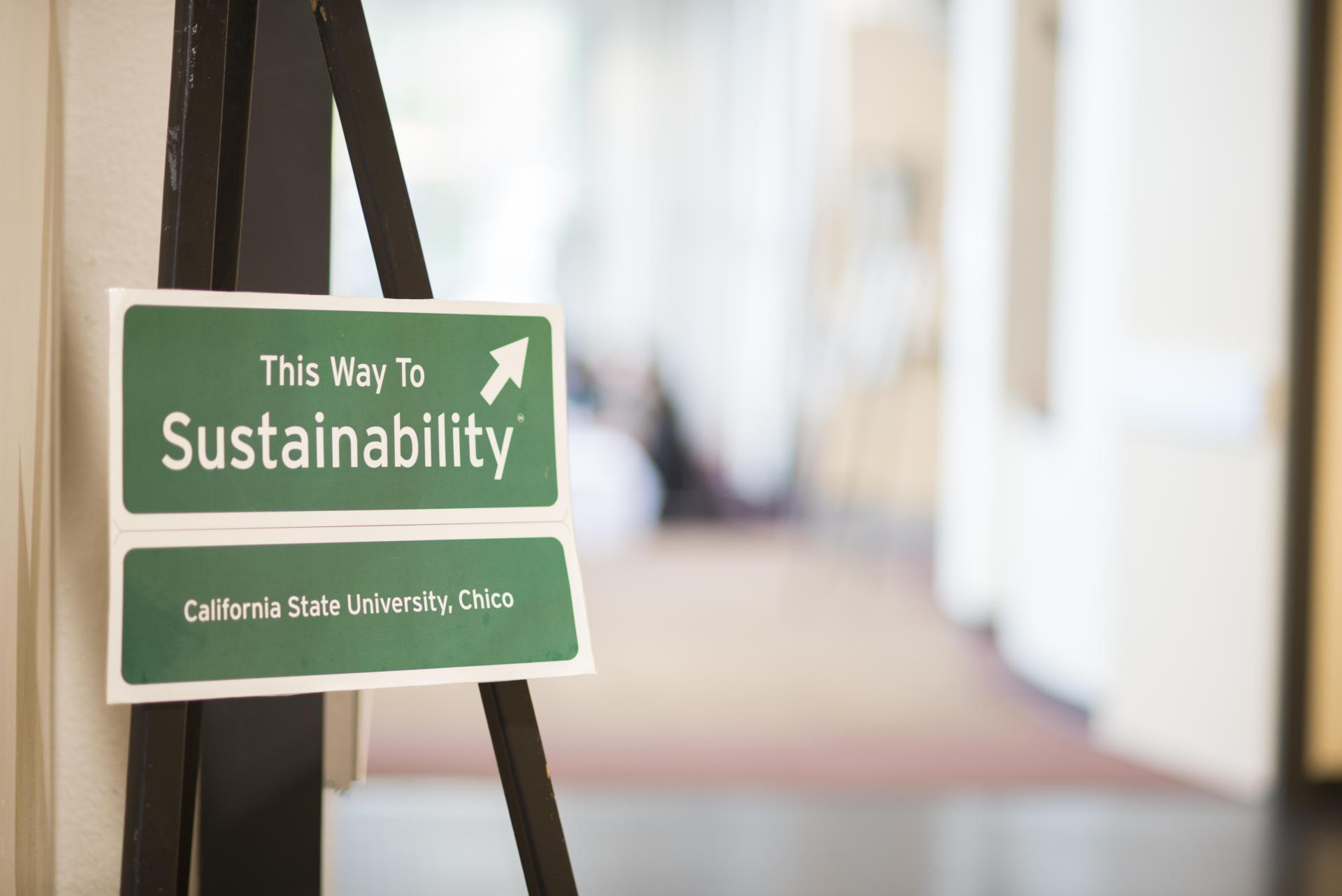CSU, Chico’s Annual ‘This Way to Sustainability’ Conference Shifts to Online Delivery

This Way to Sustainability Conference XIII sign on Friday, March 16 2018 in Chico, Calif. (Aubrie Coley/Student Photographer)
Whether it is climate change, water issues or farming techniques, California State University, Chico is a leader of researching and teaching sustainable practices.
Now, the University is pivoting in response to the global COVID-19 pandemic.
CSU, Chico’s 15th annual This Way to Sustainability Conference, the nation’s largest student-run conference, will take place virtually March 26–27—shifting from an in-person presentation to online delivery in light of the coronavirus.
To register for the conference, one-day online admission is $35 (for either day) and two-day online admission is $50. K–12 students and those from any higher education institution with a valid student identification are free. Registered attendees will receive a password for the day(s) they are registered to allow them to log in and watch the conference presentations live.
The theme of this year’s conference is “Resiliency in a Changing World”—an apt premise considering the impacts of COVID-19 around the world. Moving the conference completely to online delivery was quite a feat for an event that began its planning last spring, said Cynthia Daley, director of the Center for Regenerative Agriculture and Resilient Systems, the event’s organizers.
Three weeks before the conference, planning began to pivot as the COVID-19 situation rapidly evolved. On March 11, University President Gayle Hutchinson announced the cancellation of in-person classes from March 13–24 to help faculty prepare in the event they had to transition to online education. Two days later, the University suspended in-person instruction through April 24, and then on March 18, Hutchinson announced that CSU, Chico would move to a virtual campus for the remainder of the spring 2020 semester.
The entire conference will livestream interactive presentations from leaders, researchers and students in seven different tracks that focus on all aspects of sustainability—including environmental, land planning and natural systems; built environments, engineering and waste management; health, wellness, diet and nutrition; sustainable food systems and regenerative agriculture; entrepreneurship, marketing and supply chain management; social justice and public policy; and arts, humanities and creative expression.
“Having a virtual conference certainly presents opportunities to engage a much wider audience,” said Cheri Chastain, CSU, Chico’s Sustainability Programs Manager. “We are doing our best to push this out to as many people as we can.”
While the conference regularly attracts more than 1,000 attendees over its two days of presentations, event organizers are uncertain how the move to an online format will affect attendance. But the shift presents an excellent online learning opportunity, with the chance that viewership could surpass historical numbers.
“We are hearing that many more students from other colleges and universities are now able to participate given they do not need to cover their own travel,” Chastain said. “With limited travel budgets nearly everywhere, it’s possible that many others who typically wouldn’t be able to attend will now be able to participate.”
The conference will kick off on Thursday with words from Debra Larson, the University’s provost and vice president of Academic Affairs, and Mike Guzzi, associate vice president of facilities and capital projects. Two keynote speakers will also present on Thursday—Nikki Silvestri, CEO and founder of Soil and Shadow takes the stage at 9 a.m., and Kelsey Juliana of Our Children’s Trust, will take the stage at 1 p.m.
Erin Meezan, vice president and chief sustainability officer at Interface, is the conference’s final keynote speaker on Friday at 9 a.m.
Both Daley and Chastain said that despite the current attention on COVID-19, it’s also important to also remain focused on climate change—and that the conference presents excellent opportunities for solutions-based conversations around climate change and resilience. Its own virtual shift is a prime example of that, in by moving online, it dramatically shrinks its own carbon footprint and impacts on the natural environment.
“We hope that these immediate virtual transitions will expose people to the fact that there are different ways of continuing business as usual that do not continue to increase our greenhouse gas emissions,” Chastain said.


